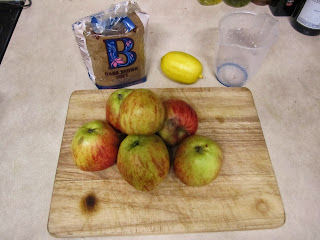As good as this Summer had been, Fall inevitably had to follow, with all the chilly rainy days and obligations that season entails. Confronted with these things, and with harvests completed, this postdoc felt he was in need of inspiration. Philomath being too far away, and not accessible by UK public transport, he turned his attention northward instead, to Lincolnshire.
Isaac Newton looms large over Cambridge, and indeed Natural Philosophie in general. It was at Trinity College Cambridge that the young Newton was educated, and later became a fellow and Lucasian professor. But it was in Woolsthorpe-by-Colsterworth in the county of Lincoln that he spent his formative years, experimented with prisms, and got inspired--by an apple tree. For once, this is a good story that appears to be based in actual fact, as Sir Isaac himself acknowledged the input a particular fruit tree had on his theory of gravity...
While Newton is one of the most influential scientists of all times, and his bones rest in prominence in Westminster Abbey, his humble assistant in his search for scientific discovery quietly remains in Lincolnshire, still blossoming in Spring, flourishing in Summer, and producing a bountiful harvest in Fall. Yes, the original apple tree, sire of the apple tree outside of Trinity College, is still there, and still inspires. After a road trip with a kind friend with a car, our postdoc was able to not only behold Newton's apple tree, and sample its fruit, but also bring, at the price of a 50 pence coin, a little piece of Lincolnshire worthy of a genius home: a small bag of unassuming and somewhat sour cooking apples, packed with hidden treasure, came down to Cambridge, and forms the basis of today's blog content.
Ingredients:
-5-6 cooking apples (Sir Isaac's are of the Flower of Kent variety)
-1 lemon
-1/2 cup of brown sugar
-1 stick of cinnamon
-a pinch of salt
Peel the apples, core them (save the seeds for planting), and quarter them. Peel off about four or five strips of lemon. In a pot, mix the ingredients, including the cinnamon stick and the sugar, and add enough water to cover everything. Cut the lemon in half, and squeeze the juice from the half lemon into the pot. Add a pinch of salt.
Turn on the stove and wait for the water to boil. Then turn down the heat and let simmer for about half an hour. In the meantime, prepare the jars. Clean the jars carefully, using boiling water.
Taste the sauce to make sure it is sweet enough; if it isn't, just add a little more sugar. If it is on the sweet side, add some more lemon juice (you still have a reserve half lemon, right?). Once you're satisfied with the level of sweetness, and once the apple pieces feel soft enough, fish out the cinnamon stick and the lemon peel. Then pour off surplus apple juice into a glass as necessary (it is a pretty yummy drink in its own right), then mash up the apple pieces using a wooden spoon or a potato masher.
Fill up your jars with apple sauce, and you're done. Enjoy with yoghurt or porridge for breakfast, or with vanilla ice cream for dessert. Feel inspired.
Serving suggestions: Taylor's of Harrogate breakfast tea, "Martin Carthy" by Martin Carthy on the side.




This is exceptionally educational and supportive post in the blog posting world. All Your posts consistently give us some subjective things. thank you such a for sharing this post.
ReplyDeletehttps://1nightgirl.com/daultabad-call-girl.html